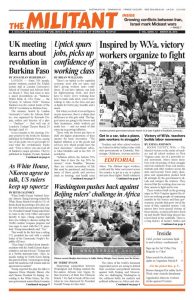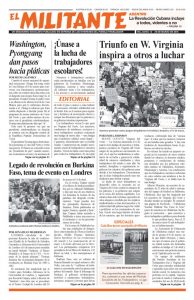When South Korean National Security Adviser Chung Eui-yong visited the White House March 8 to talk to U.S. officials about his meeting a few days earlier with North Korean leader Kim Jong Un, President Donald Trump asked him to come to the Oval Office and report directly to him. Chung reported that Kim was willing to discuss ending the North’s nuclear weapons program and was eager to meet with the U.S. president. Trump immediately said, “Yes.”
This would be the first time a sitting U.S. president has met with a central leader of the Democratic People’s Republic of Korea.
“Kim Jong Un talked about denuclearization with the South Korean Representatives, not just a freeze,” Trump said in a Twitter statement later. “Also, no missile testing by North Korea during this period of time. Great progress being made but sanctions will remain until an agreement is reached.”
Trump reported the plan for talks to Japanese Prime Minister Shinzo Abe and Chinese President Xi Jinping. According to the White House, the Chinese government assured him it remains “committed” to keeping up the pressure.
Chung met with Xi in Beijing four days later. “That we were able to get to this stage shows China has played an important role,” Chung told the press.
As a result of years of sanctions by Washington and the U.N., some 90 percent of North Korean trade today is with China. Beijing’s stepped-up implementation of the sanctions over the last six months has had a major impact on the North, hitting hardest on working people. The U.S.-led sanctions has resulted in factory closings, the forced return of North Koreans working abroad who have been terminated, and food shortages.
The liberal media, Democrats and some Republican opponents of Trump — who view all politics through the prism of “resistance” to his presidency — have insisted his administration didn’t know what it was doing and his bellicose verbiage risked leading to war. Many have now turned full circle, saying Trump has caved in to the North.
And they insist President Trump will screw them up. “This is stunning: President Trump has accepted an invitation from Kim Jong-un for a summit,” wrote New York Times columnist Nicholas Kristof March 8, calling it “a dangerous gamble and a bad idea.”
“I can’t believe I’m saying that,” he added, noting that for years he’s argued for direct talks between the two governments. But now he’s terrified that it’s Trump, God forbid, who will be negotiating.
“The Republic of Korea, the United States, and our partners stand together in insisting that we not repeat the mistakes of the past,” South Korean security adviser Chung said. One of those mistakes in their view is the way the 1994 agreement between Pyongyang and the U.S. administration of Bill Clinton worked out.
At that time, the North Korean government agreed to halt the development of electricity-generating nuclear reactors that produce plutonium that could be used in nuclear weapons. In exchange, the U.S. government agreed to construct two light-water reactors that generate electricity while producing little recoverable plutonium, deliver heavy oil to generate power until the reactors were built, suspend annual U.S.-South Korea military exercises, and provide assurances that it would neither threaten nor use nuclear weapons.
The Financial Times, the Wall Street Journal and all the pundits claim that the 1994 agreement failed because of “cheating” by Pyongyang.
But it failed because Washington didn’t honor its side of the bargain. The light-water reactors were never completed. In January 2002, President George W. Bush labeled North Korea part of an “axis of evil” and said Washington was no longer bound by the earlier promises to not use nuclear weapons. At the end of the year, Washington halted oil shipments to the North. The agreement was dead.
US rulers’ long war against Korea
Korea was divided against the will of the Korean people at the end of the second imperialist world war, when Washington, with the collusion of the Stalinist regime in Moscow, occupied the southern half of the country and installed the Syngman Rhee dictatorship.
After the outbreak of the 1950-53 Korean War, Washington and allied U.N. troops drove through the North, almost to the Chinese border. U.S. bombers leveled almost every building in the North. They dropped tons of napalm, burning people alive. More than 4 million people, including 2 million civilians, were killed. But North Korean soldiers, helped by Chinese volunteers, pushed the U.S. Army back to the 38th parallel, dealing U.S. imperialism its first military defeat.
To this day Washington refuses to sign a peace treaty with the North and still has 28,500 troops based in the South.
Pyongyang developed nuclear weapons, saying that having them was necessary to prevent a U.S. attack. But possessing nuclear weapons — and threatening to use them against South Korea and the U.S. — undercuts the moral high ground the Korean people had won from decades of standing up to U.S. imperialism.
The Socialist Workers Party has opposed U.S. imperialism’s intervention in Korea and its artificial division into two countries from the beginning.
In a Feb. 15 letter to the Korean people on behalf of the National Committee of the SWP, Steve Clark reaffirmed the party’s commitment to stand with them, demanding the U.S. rulers sign a peace treaty; end the “provocative and threatening” annual joint U.S.-South Korean war maneuvers; withdraw all U.S. troops and armaments from Korea’s soil, skies and waters; and end all the economic sanctions against North Korea.
Join the fight for a Korean Peninsula and Pacific Ocean free of all nuclear weapons!

